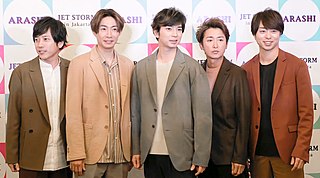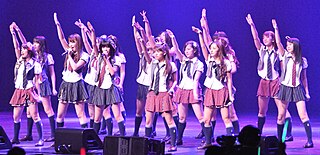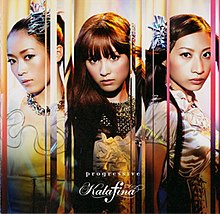
Ayumi Hamasaki is a Japanese singer, songwriter, record producer, actress, model, spokesperson and entrepreneur. Through her entire career, she has written all her lyrical content, and has sometimes composed her music.
J-pop, natively also known simply as pops, is a musical genre that entered the musical mainstream of Japan in the 1990s. Modern J-pop has its roots in traditional Japanese music, but significantly in 1960s pop and rock music, such as The Beatles and The Beach Boys, which led to Japanese rock bands such as Happy End fusing rock with Japanese music in the early 1970s. J-pop was further defined by new wave and crossover fusion acts of the late 1970s such as Yellow Magic Orchestra and Southern All Stars, then Eurobeat in the early 1990s, namely Namie Amuro.
Mai Kuraki is a Japanese pop and R&B singer-songwriter and record producer. After releasing her US debut single "Baby I Like" in 1999, Kuraki signed with Giza Studio and released her Japanese debut single "Love, Day After Tomorrow" in 1999. In 2000, she released her debut album, Delicious Way, which debuted at number-one and sold over 2.2 million copies in its first week. The album has spawned four top-three singles, "Love, Day After Tomorrow", "Stay by My Side", "Secret of My Heart", and "Never Gonna Give You Up". Eventually, the album sold over 3.5 million copies nationwide and became the best-selling album in Japan in 2000, and has been the ninth best-selling album in Japan of all-time.

Arashi is Japanese boy band consisting of five members formed under the Johnny & Associates talent agency. The members are Satoshi Ohno, Sho Sakurai, Masaki Aiba, Kazunari Ninomiya, and Jun Matsumoto. Arashi officially formed on September 15, 1999, in Honolulu, Hawaii, and made their debut CD on November 3, 1999. The group was initially signed to Pony Canyon and released one studio album and six singles—beginning with their 1999 eponymous debut single before moving to the Johnny's subsidiary label J Storm in 2001, which was initially set up for their succeeding releases. While their debut single sold close to a million copies, the group took a mixture of pop and alternate/contemporary approach to its music which attracted core followers, but subsequently faced commercially slow sales.

Namie Amuro is a former Japanese recording artist, producer, songwriter, dancer, model, actress and entrepreneur who was active between 1992 and 2018. A leading figure of the Japanese entertainment industry since the early 1990s, Amuro is known for breaking the youthful idol stereotype of J-Pop, changing the fashion trends and lifestyle of women in Japan, her experimentation across music styles, and for her visual imagery in music videos and live performances. Due to her career longevity, resilience, professionalism, efforts behind-the-scenes in the music industry, and her way of life, she is a pop culture icon in Japan and Asia. She has been referred to as "Diva of Heisei era" and the "Queen of Japanese Pop", and has been recognized as having the influence and career impact domestically equivalent to artists such as Janet Jackson and Madonna in Western music and pop culture.
Toshinobu "Toshi" Kubota is a Japanese singer, songwriter, musician, music producer, and radio personality. Toshinobu Kubota has produced six million-seller records and thirty-three Top 40 singles during his career. He is currently part of Sony Music Japan. In addition, Kubota has composed and written songs for many singers including Iwasaki Hiromi, Misia, Toshinori Yonekura, Koizumi Kyoko, and many other recording artists.

Kumiko Kōda, known professionally as Koda Kumi, is a Japanese singer from Kyoto, known for her urban and R&B songs.
Orange Range are a 5-member Japanese rock band, based in Okinawa, Japan. Formed in 2001, the band began with Spice Music and later signed with Sony Music Japan's gr8! records division in 2003. The band left gr8! records in 2010 to start their own label, Super Echo.

TVXQ, an initialism for Tong Vfang Xien Qi, is a South Korean pop duo consisting of U-Know Yunho and Max Changmin. They are known as Tohoshinki in Japanese releases, and are sometimes referred to as DBSK, an abbreviation of their Korean name Dong Bang Shin Ki (Korean: 동방신기). Their name roughly translates to "Rising Gods of the East".

High and Mighty Color was a Japanese rock band active from 2003 to 2010. They had two vocalists; a male and a female.
NEWS is a three-member Japanese band consisting of Keiichiro Koyama, Takahisa Masuda and Shigeaki Kato. The group's name is an acronym based on the cardinal directions. Formed in 2003 by Johnny Kitagawa as a nine-member group under the label Johnny's Entertainment, NEWS released a promotional single "NEWS Nippon", which was used for the World Cup of Volleyball Championships. In 2004, Takahiro Moriuchi left the group and the remaining eight members released their debut single, "Kibō: Yell", which debuted atop the Oricon charts.

Yui, stylized as YUI or yui, is a Japanese singer-songwriter, multi-instrumentalist, and actress. In her solo career, she sold more than 5 million physical copies in Japan. She is popular in Japan and in surrounding countries, ranking number one in 2011 Count Down TV "Dearest Female Artist" and Music Station "Artist You Most Want to Marry" polls, as well as Radio Television Hong Kong's "Most Popular Japanese Artist".

Dschinghis Khan was the West German entry in the Eurovision Song Contest 1979, performed in German by Dschinghis Khan. Cover versions by a number of other artists were subsequently released as singles and album tracks.

AKB48 are a Japanese idol group named after the Akihabara area in Tokyo, where the group's theater is located. AKB48's producer, Yasushi Akimoto, wanted to form a girl group with its own theater and performing daily so fans could always see them live. This "idols you can meet" concept includes teams which can rotate performances and perform simultaneously at several events and "handshake" events, where fans can meet group members. Akimoto has expanded the AKB48 concept to several girl groups in China, Japan, Indonesia, Thailand, Taiwan, Philippines, and Vietnam.

Heavy Gauge is the 6th album by Japanese rock band Glay. This is the first album which Glay dabbles in the genres of progressive rock and gospel, using progressive chords on songs like the self-titled track, and using gospel choirs in songs such as "Will Be King" and "Happiness". This album also marks a milestone in Glay's career with their hit song "Winter, Again". The song won Single of the Year (1999) at the Japan Record Award. Many songs from the album were used in the Meiji Seika Kaisha advertising campaigns for their "Horn" and "Flan" product food lines. The album reached #1 on Oricon charts and sold about 2,370,000. The album was certified "Double Million" by the Recording Industry Association of Japan (RIAJ).

Masahiko Kondō or Matchy is a Japanese singer, lyricist, actor, racing car manager and former semi-professional racing driver. He was a member of the Tanokin Trio.

CNBLUE is a South Korean pop rock band formed in 2009. The band consists of Jung Yong-hwa, Kang Min-hyuk (drums), and Lee Jung-shin (bass). First bassist Kwon Kwang-jin left the band after they released their debut Japanese extended play Now or Never in 2009, and was replaced by Lee Jung-shin. Lee Jong-hyun left the band on August 28, 2019.
The Oricon Albums Chart is the Japanese music industry standard albums popularity chart issued daily, weekly, monthly and yearly by Oricon. Oricon originally published LP, CT, Cartridge and CD charts prior to the establishment of the Oricon Albums Chart on October 5, 1987. The Oricon Albums Chart's rankings are based on physical albums' sales. Oricon did not include download sales until its establishment of the Digital Albums Chart on November 19, 2016.
The Oricon Singles Chart is the Japanese music industry-standard singles popularity chart issued daily, weekly, monthly and yearly by Oricon. Chart rankings are based on physical singles' sales. Oricon does not include download sales. In Japan, physical sales decreased sharply in the 2000s, while download sales hit three to four times the amount of single sales.
Johnny's West is a seven-member Japanese boyband consisting of Daiki Shigeoka, Junta Nakama, Takahiro Hamada, Aikito Kiriyama, Tomohiro Kamiyama, Ryusei Fujii, and Nozomu Kotaki. The group's name comes from the fact that it originated within the Johnny's Entertainment talent agency, and that the members are from Kansai, the west region of Japan. They are the first group from Kansai Johnny's Jr. that has debuted in ten years, the last being Kanjani Eight. Debuting in 2014 with the single "Eejanaika", they sing mainly in the Kansai dialect. Their single Start Dash, and Kizudarake no Ai will become first and second opening single from Captain Tsubasa (2018) by David Production.












